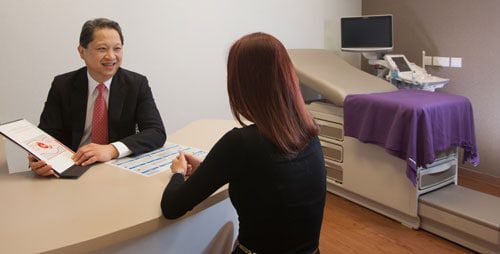Before trying for a baby, it is not too early to start getting your body ready for pregnancy. Be it your first or a subsequent pregnancy, it is important for you and your partner to ensure that your health is optimal to prepare for a healthy pregnancy ahead.
Pre-Conception
How Can You Prepare for Pregnancy

Lifestyle Changes to Prepare for Pregnancy
- Being overweight or underweight could affect your ovulation and fertility, so it’s important to maintain a healthy BMI.
- Boost your consumption of iron and calcium-rich foods while reducing unhealthy fat intake.
- Getting regular physical activity not only helps you before, but also during pregnancy by boosting your energy and helping you cope with stress.
- Avoid smoking and cut back on caffeine and alcohol consumption as these can hamper efforts at conceiving.
- Start taking prenatal supplements in the pre-conception stage – these supplements are rich in folic acid and help ensure a healthy pregnancy.
- Stop contraception – Women trying to conceive should stop contraceptive pills or patches several months before trying for a baby. While some women resume their cycle immediately, others may take several months to resume regular ovulation and menstrual cycle.
Start Tracking When You Ovulate
Ovulation is the fertile window in a woman’s monthly reproductive cycle. Having sex during ovulation has an increased chance of pregnancy.
Ovulation occurs when a mature egg is released from the ovary and moves down the fallopian tube for fertilisation to occur. The egg survives for 12-24 hours after leaving the ovary.
If it is successfully fertilised by a sperm within this timeframe, then conception has occurred. Otherwise, the unfertilised egg, together with the thickened uterine lining is shed in what is known as menstruation.
Ovulation occurs on average once a month if you have a regular menstrual and ovulation cycle. It can be calculated by subtracting 12 to 16 days from your next expected period.
Some women may experience symptoms during ovulation, including a change in basal body temperature, clear cervical fluid with the consistency of ‘egg whites’, breast tenderness or increased sex drive.
Ovulation can occur regardless of whether a menstrual period has occurred. Likewise, menstruation can also take place if ovulation is absent. Reasons for delayed or absence of ovulation include stress, illness or disruption of normal routines.
If you are planning to conceive, it is important to track your menstrual cycle and identify when your ovulation window occurs.


Pre-Pregnancy Care
A pre-pregnancy check-up is a medical check performed by your gynaecologist or obstetrician to ensure that you are in a good state of health before trying for pregnancy. The check-up includes various screening tests to help check for any existing medical condition, genetic diseases or infectious diseases that could be passed down to your baby if you get pregnant. Also, if you have pre-existing medical conditions such as diabetes, hypertension, hypo- or hyper-thyroidism or PCOS, your doctor can advise you on your long-term medications, should you decide to try for a baby.
What does Pre-conception Screening Include?
- An ultrasound scan of your womb for any abnormalities in the womb that could possibly affect your chances of pregnancy.
- A check of you and your spouse for any existing medical condition such as:
- Genetic diseases
e.g. thalassemia (a blood disorder affecting 3-4% of the local population, that can be easily detected with a simple blood test; it can lead to a severe form of thalassemia in the baby sometimes, resulting in the need for blood transfusion) - Infection e.g. Venereal Diseases/ Sexually-Transmitted Infections (STI)
- Hepatitis
- Rubella (can cause severe defects to the baby if infection occurs)
- Genetic diseases
- A sperm analysis might be included
- Pregnancy planning advice (especially important for couples with pre-existing medical conditions e.g. PCOS, thyroid issues, diabetes etc.)
- Advice on nutrition and supplementation to prepare for pregnancy

Why is a Pre-pregnancy Check Important?
While most women and married couples are aware of antenatal care, not many are aware of the importance of pre-pregnancy care. Most couples simply assume that pre-pregnancy care is simply taking folic acid daily – that is just the tip of the iceberg.
Pregnancy care often starts even before pregnancy begins, hence the term “pre-pregnancy care”. This is increasingly important, as more women are having babies later in life. Women who give birth after the age of 35 years old, regardless of whether it is her first or second pregnancy, are classified as “elderly mothers”. In such cases, it is important for a couple to manage their own health even before pregnancy begins, with advice from an obstetrician during the process of planning for pregnancy.
FAQs
Do I need to go for a pre-conception screening as a couple?
While it would be best to consult the gynaecologist together as a couple, it is also fine to visit the gynaecologist first without your husband if he is unavailable, as many of the tests are for the ladies. Subsequent tests for your husband can be arranged at a second visit if needed.
How much is a pre-conception check-up in Singapore?
Under the SMG Women’s Health group of gynaecologists, the pre-conception screening tests are often customised based on the needs of the couples. The basic fees, however, will include the price of your consultation and an ultrasound scan.
Is a pre-conception screening the same as a fertility assessment?
Pre-conception screening is not the same as a fertility assessment in Singapore although some of the test components are the same. However, the focus of a fertility assessment would be to find out the causes of infertility while a pre-conception check is very much like a health check prior to pregnancy.
Find out more about the differences between a pre-conception screening and fertility assessment.
Need to consult an O&G specialist?
The male and female O&G specialists in our clinic network are located at multiple locations in Singapore for easy and quick access.


